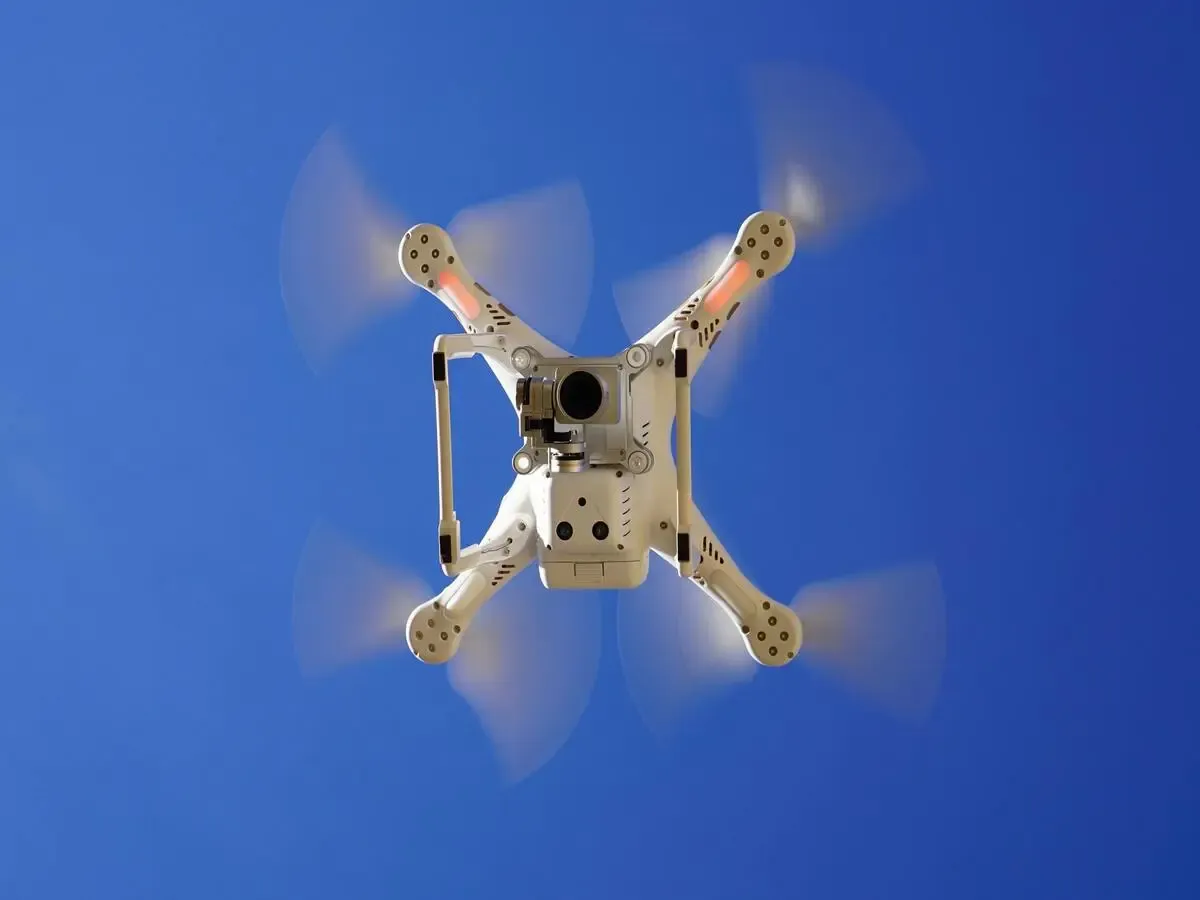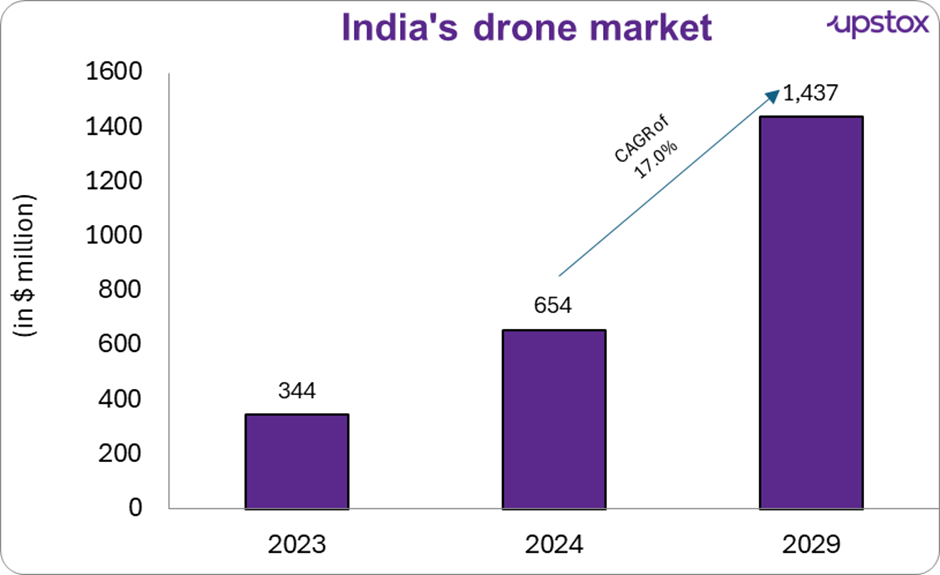Upstox Originals
From novelty to necessity: India's drone sector takes off
.png)
6 min read | Updated on May 09, 2025, 17:25 IST
SUMMARY
While drones often grab headlines for their futuristic appeal, India’s drone journey runs far deeper. With market projections showing strong growth (17% CAGR), drones are transitioning from futuristic gadgets to practical tools across sectors like agriculture, defense, and last-mile deliveries. In this article, we’ll break down the key forces powering this billion-dollar sector.

India's drone industry has doubled in size over 2013-14
The drone industry in India is steadily gaining momentum and attracting widespread attention. What’s driving this progress? A mix of government support, tech innovation, and investor interest. From farmlands to cities, drones are steadily becoming part of India’s tech-driven future.

Source- MarketsandMarkets
Where and how drones are being used in India
From major corporations to government bodies, drones in India are being used for medicine delivery, infrastructure monitoring, and smarter farming—solving real-world challenges across sectors. Below is a table highlighting some notable organisations and their drone-powered initiatives across India:
| Organisation | Drone usage |
|---|---|
| Tata 1mg | Tata 1mg has initiated the use of drone delivery services for medications in Dehradun. |
| Swiggy | Swiggy piloted with Garuda Aerospace to employ drone tech for grocery deliveries in Delhi NCR and Bengaluru. |
| Flipkart | During COVID, Flipkart partnered with the Telangana government for drone delivery of life-saving medicines and expanded trials to transport smaller shipments from warehouses to distribution centers for middle-mile deliveries. |
| Indian Army | The Indian army uses drones for border surveillance and anti-terror operations |
| Delhivery | Delhivery piloted using drones for delivering payloads weighing upto 4 Kg |
Source- Inc42
Key players entering the drone manufacturing market India’s drone manufacturing is booming, with players like HAL, Zen Technologies, Paras Defence, and Droneacharya leading the charge. Below is a table highlighting some of the key companies entering and growing in this evolving market:
| Company name | Market cap (₹ Cr) | P/E ratio | ROE (%) | 3y Profit (CAGR %) | 3y Price (CAGR %) |
|---|---|---|---|---|---|
| Hindustan Aeronautics | 2,86,503 | 33.1 | 28.9% | 33% | 73% |
| Zen Technologies | 13,199 | 62.0 | 33.0% | 257% | 93% |
| Paras Defence and Space Technologies | 4,279 | 85.2 | 7.0% | 24% | 14% |
| Droneacharya Aerial Innovations | 164 | 29.5 | 8.6% | 247% | N.A |
| Average | 76,036.2 | 52.4 | 19.4 | 140.2 | 60% |
Source- Screener
Training takes off: India’s drone pilots in the making
Flying drones isn’t just plug-and-play—it takes skill. That’s why India is seeing a rise in drone training hubs. Institutes like DroneAcharya and IG Drones are teaching everything from flight controls to data handling. With drones in demand across sectors, these courses are opening up exciting new career paths, especially for youth in both cities and small towns.
Startups fuelling the drone boom
India’s drone revolution is being powered by a wave of smart startups. Names like Garuda Aerospace, IdeaForge, and Throttle Aerospace are building drones for agriculture, surveillance, and disaster relief. Backed by innovation hubs like T-Hub and iCreate, these homegrown companies are solving real-world problems—one flight at a time.
How drones are changing the game across sectors
Drones in India aren’t just about cool tech—they’re becoming real problem-solvers across different industries. From boosting farm output to speeding up deliveries, here’s how they’re quietly transforming the way things work:
Transforming agriculture in India with drone technology
-
Better crop health monitoring: Drones are helping farmers scan huge fields, capturing data that shows which crops need attention, be it water, nutrients, or pest control.
-
Precise spraying of inputs: With tech-equipped sprayers, drones apply fertilizers and pesticides only where needed, cutting down on waste and protecting the environment.
-
Quick field checks: High-quality drone cameras help monitor crop growth, spot problem areas, and even predict yields, making harvest planning a lot more efficient.
-
Easy access to tough terrain: In hilly or remote areas, drones can cover ground that’s hard to reach otherwise, saving both time and manpower.
Integrating drone innovation into the logistics industry
-
Faster last-mile deliveries: Drones are now being used to drop off small packages in crowded cities and far-off villages, especially where roads are a challenge.
-
Helping in emergencies: In urgent situations, drones can carry medical kits or supplies to disaster-hit areas or remote locations, where regular transport struggles.
-
Improved warehouse tracking: Inside warehouses, drones scan and track inventory way faster than humans, helping companies manage stock more accurately.
-
Saving time and costs: By skipping traffic and flying straight to their destinations, drones help cut down both delivery times and overall expenses.
Drone applications in India’s defence and security landscape
-
Eyes in the sky: In defense, drones provide live aerial views for patrolling borders, tracking movements, and gathering intelligence, without putting personnel at risk.
-
Pinpoint target tracking: Armed drones use advanced tech to locate and follow targets with high accuracy, making operations more effective.
-
Support for ground teams: During missions, drones assist by giving a bird’s-eye view of enemy positions, helping guide strategy, and offering real-time support.
Drone technology in cinematography and recreational spaces
-
Aerial filming made easy: Drones have made it simpler and cheaper for filmmakers to shoot from above—no need for helicopters or bulky equipment.
-
New angles, new stories: With smooth flight and flexible angles, drones bring a fresh perspective to videos, adding stunning visuals that were once tough to capture.
-
From farmlands to film sets, and warehouses to war zones, drones are quietly reshaping how things get done. Their growing presence across industries shows that they're not just flying tools; they’re becoming everyday essentials.
Policy push: How India is clearing the flight path
India’s liberalised drone rules (Drone Rules 2021) have made it easier for operators to get clearances and operate drones legally. Initiatives like the PLI (Production Linked Incentive) scheme for drones and the Digital Sky Platform have encouraged both manufacturers and users to innovate within a structured framework. The ban on importing drones (except for R&D and defense) is also pushing homegrown innovation.
Challenges
India’s drone sector, while expanding, continues to face critical operational challenges. Regulatory frameworks remain complex, with restrictions around airspace, altitude, and licensing slowing down broader adoption. Safety and privacy concerns are significant, given that drones are a flying mode of operation, they can inadvertently enter private spaces such as homes or offices, raising serious concerns over unauthorised surveillance.
Infrastructure gaps, including insufficient charging stations, landing zones, and maintenance access in remote areas, further restrict scalability. Moreover, the limited availability of trained drone operators and technicians continues to hinder industry growth.
Final thoughts
India’s drone boom is more than a tech trend—it’s a shift in how the country moves, protects, grows, and entertains. With strong policy backing and a thriving startup ecosystem, drones are becoming everyday problem-solvers across sectors. From battlefield strategy to farm fields and city logistics, the impact is real and rising.
By signing up you agree to Upstox’s Terms & Conditions
About The Author
Next Story
